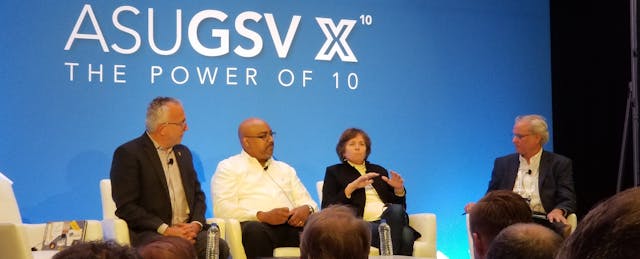With more than 4,700 attendees and hundreds of sessions, the sheer scale of ASU GSV can leave attendants with a case of information overload. But several themes continually emerged on stage. Here’s what’s buzzing across an expanding education industry whose focus now spans from early childhood learners to adults throughout their careers.
Education as an employee benefit
Learning doesn’t stop once you land a job. And the presence of executives from companies outside of the industry reinforced that point. Several employers praised companies like Guild Education for connecting them with schools to offer their employees access to college courses and degrees as a benefit.
“It’s hard to make an informed choice for your child, let alone your employees,” said Jon Kaplan, chief learning officer at Discover Financial. Kaplan means his company worked with Guild to narrow down which schools aligned with the programs Discover wanted to support. In a blog post last year, he said 10 percent of the company scheduled academic counseling sessions during the first two-plus months of the program, and 500 employees submitted college applications to eligible degree programs.
The Walt Disney Company, another Guild partner, saw 40 percent of eligible employees sign onto its education program and 6 percent complete courses in the first seven months of the program’s launch in August, Disney’s Vice President of Learning and Development Chris Trout said.
Pivoting is part of the process
Difficult decisions are part of an entrepreneur’s job, and education companies are no exception. For example, Matthew Hammersley, CEO of Novel Effect, a children-focused literacy company, told a crowd he parted ways with an early chief technology officer and shifted his company directly selling to schools to licensing its technology. Brett Kopf, Remind’s co-founder and first CEO, said one of the hardest decisions in his life was to step down so that the private mobile messaging platform could hire a seasoned executive to scale the company.
And on a panel that featured horror stories during the turnaround of struggling schools, Paul Quinn College President Michael Sorrell said he’d never fired anyone before getting the job in 2007. He would go onto replace about 95 percent of the staff and eliminate the school’s football program as part of a plan to save the school from financial dire straits and possible accreditation loss. “I didn’t want to be the person to kill it,” he said of the Dallas, Texas-based private, faith-based college founded in 1872. For his efforts, Sorrell received ASU GSV’s Innovator of Color Award.
What the college admissions scandal really says
The college-admissions scandal also took front and center stage throughout the conference. Whiteboard Advisors CEO Ben Wallerstein lamented how coverage of the scandal centered on rich parents but didn’t further examine the inequalities that exist across all levels of the education system. “That’s not news,” Wallerstein said of affluent parents finding preferential treatment.
Arizona State University President Michael Crow blamed elite universities for using low admissions rates to perpetuate their prestige and status. To him, this can foster the sense where attending a school becomes more of a bragging right for students and families. He encouraged people to understand the value of less flashy schools.
“Admission to a college shouldn’t be the achievement,” he told EdSurge. “It’s the success at the college and what you do with the college. So what we have is just a totally perverse outcome.”
Arne Duncan, managing partner at Emerson Collective and former U.S. secretary of education, pointed out that students from wealthy families who score low on college readiness exams still have a better chance of graduating college than high-scoring students from lower-income families. “The truth is: there is privilege in every part of our education, starting in kindergarten,” Duncan said.
Be a partner, not a vendor
For companies involved in education, their executives can often forget to do their homework when it comes to contracting with colleges. Such was the exasperation expressed during a panel where university chief information officers aired grievances about working with company representatives who didn’t know security standards the colleges demanded. Or whose technology wasn’t ready to serve a large number of students. Or company representatives who didn’t know which official controlled the money and who had to sign off on the deal.
Duke University CIO Tracy Futhey said companies shouldn’t come into a meeting expecting to close a sale. Instead, they may explore whether a partnership where university staff try out a product or perform a study to prove its outcomes is as valuable as making money off the university, she said.
A company executive may have a compelling product or service, but that executive has to know what particular problem it solves for a school of almost 50,000 students like the University of Illinois at Urbana-Champaign, CIO Mark Henderson told the crowd. “Be candid in your value proposition,” Henderson said.


